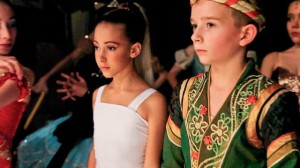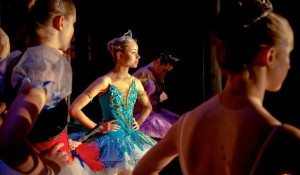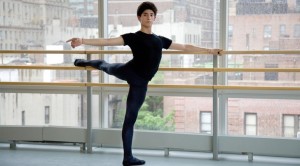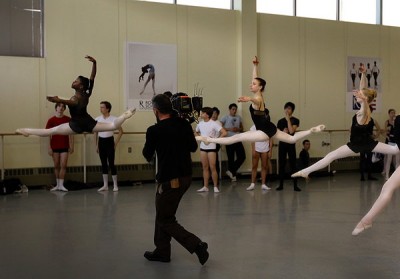
You will notice that I identify Bess Kargman’s First Position as a “competition documentary.” This is an attempt to make it clear that the film has a dramatic arc, making it perhaps more appealing to the documentary-resistant among us. If you saw the 2002 documentary Spellbound—which focused on eight contestants at the National Spelling Bee—you may have some idea of how this works. First Position follows the approach of that film pretty closely, though I have to say I enjoyed this more. Was it the subject matter? The personalities of the children? I’m not sure, though I definitely had a larger emotional investment here. In First Position there were definitely kids I wanted to see win, so I suppose it was the personalities—or possibly something else that I’ll come back to.

The film follows seven kids—Aran Bell, Gaya Bommer Yemini, Michaela Deprince, Jules Jarvis Fogarty, Miko Fogarty, Rebecca Houseknecht, Joan Sebastian Zamora—as they prepare themselves for the big Youth American Grand Prix student dance competition. There they will compete in front of judges for awards and scholarships in the younger divisions, and possibly even land jobs in the oldest one. Since the film’s tagline is “6 dancers, 5 minutes on stage, 1 chance to make it,” it’s clear that one of the seven isn’t going to make it to the competition. I suppose it’s the filmmaker’s extremely good fortune that six of them did make it. (You might even question if Kargman covered more potential dancers in order to be sure she had enough for the competition, but apparently that’s not the case.)

It doesn’t take much math to realize that this small selection of dancers with (supposedly) five minutes onstage (I don’t think any of the routines was nearly that long), the bulk of the movie will be involved in building up to the event. This also makes for better drama. A great deal of the movie concerns itself with giving us the backgrounds of the contestants. I don’t think Kargman stacked the deck, but two of the kids are inherently more sympathetic than the others. Joan Sebastian Zamora, a senior-level boy from Colombia, and middle level Michaela Deprince, an adoptee from Sierra Leone, have more compelling backstories than the others. One reviewer, I notice, claims that Kargman evidences a prejudice for them over the upscale, self-proclaimed “princess,” Rebecca Houseknecht. I don’t think this is true—anything that comes down against Rebecca she does herself and it’s never that bad—and even if it was, Kargman has no power over the outcome of the competition. Also, I missed the part where the film claimed Kargman was objective.

I’m not going to get into the matter of who wins what or doesn’t win at all. That’s the right of the film itself to tell you. But I will say that the film—even if you aren’t that jazzed about ballet—is compelling, entertaining, satisfying and surprisingly moving. While I don’t—as a rule—think documentaries necessarily benefit that much from being seen on the big screen, I do believe that dance documentaries are an exception to that. Also, this is the kind of movie that will benefit from being seen with an audience vibe. Not Rated, but contains nothing objectionable.




While I don’t — as a rule — think documentaries necessarily benefit that much from being seen on the big screen, I do believe that dance documentaries are an exception to that.
Surely any film with half-decent cinematography benefits from being seen on the big screen.
Most documentaries have only adequate photography and little visual panache.